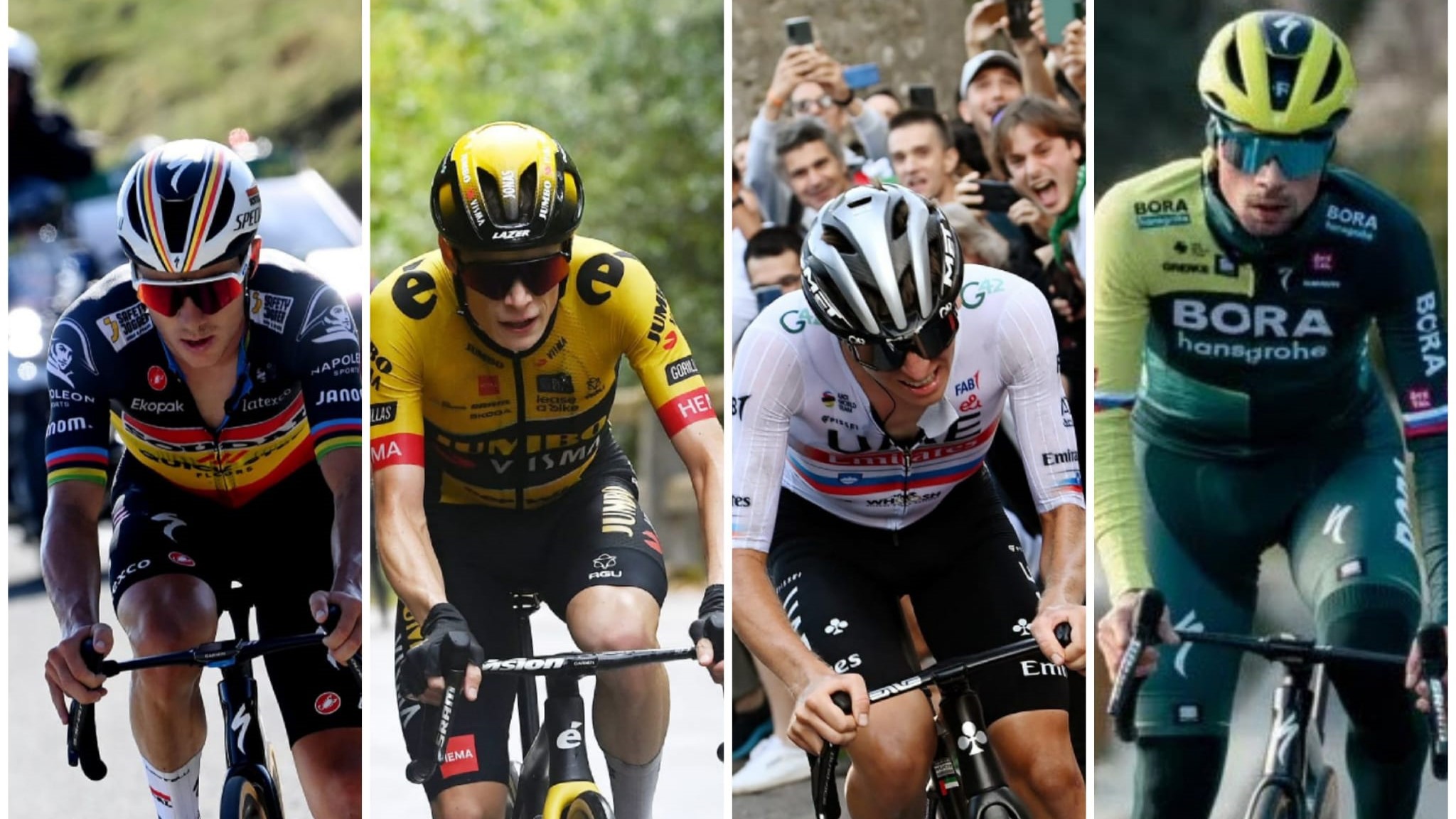
There are four main contenders for the 2024 Tour de France, and Rolf Aldag has been around this game long enough to know that their every move – and, above all, their every head-to-head contest – will be analysed to the nth degree all the way from here to the Grand Départ in Florence on June 29.
After sketching a rough outline of Primož Roglič’s deliberately sparse racing schedule at Bora-Hansgrohe’s media day in Palma de Mallorca on Wednesday, Aldag was keen to downplay the importance of any clashes between his new leader and the other Tour favourites in the early part of the year.
“We cannot feed the excitement of the fans and the media about ‘Wow, when are we going to see the Big Four clashing together with Primož, Jonas, Remco and Tadej?’” Aldag said.
“Where we want to clash is at the Tour de France, so it’s not really relevant if we aim for Catalunya or Pais Vasco. What’s relevant is whether the races help us towards Nice and the end of the Tour.”
After Tadej Pogačar and Jonas Vingegaard presented their schedules in December, Roglič and Remco Evenepoel followed suit at their recent media days. Vinegaard, the defending champion, is the logical favourite for the Tour, of course, and the two-time champion Pogačar, his most obvious challenger, despite his participation in the Giro d’Italia.
Roglič’s reboot at Bora-Hansgrohe after his departure from Jumbo-Visma changes the dynamic of the race, however, and the Slovenian is emphatically in the hunt for overall victory. Evenepoel’s credentials are perhaps less certain, but the Belgian has every right to approach his Tour debut with the highest of ambition given his progress to this point.
The 2024 Tour has four podium favourites, in other words, each in different phases of their careers and each following his own, carefully curated path to the main event.
Each calendar comes with a caveat, of course. Last-minute changes in schedule are increasingly en vogue among the WorldTour’s big hitters – witness Roglič’s surprise late entry at Tirreno-Adriatico last year – but as the new season gets underway, Cyclingnews takes a look at four favourites' publicly stated approaches to the Tour.
Tadej Pogačar
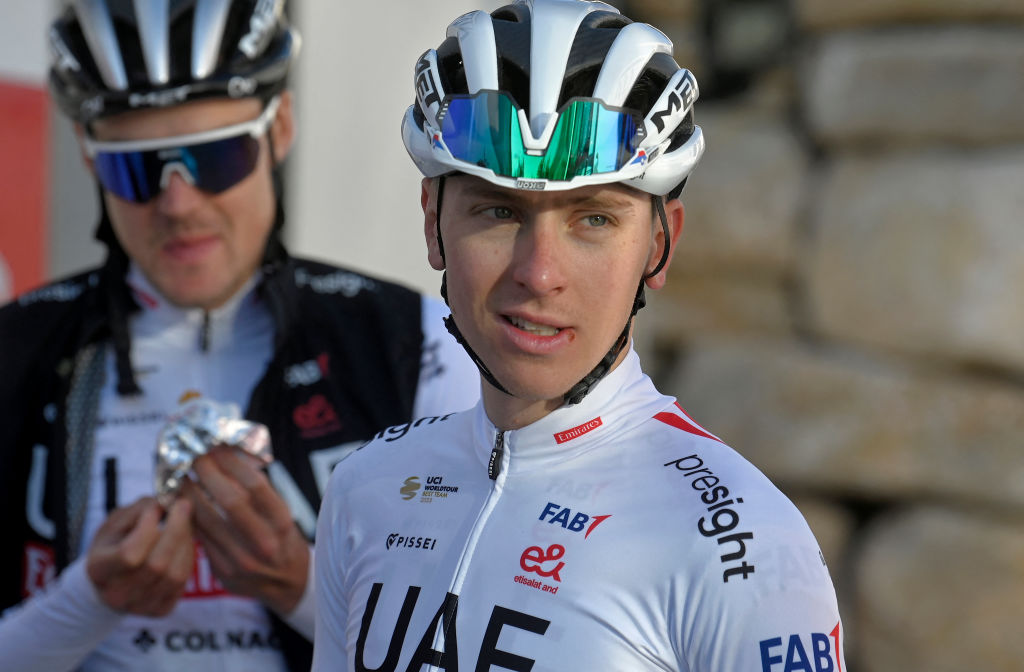
Pre-Tour schedule:
- Strade Bianche (March 2)
- Milan-San Remo (March 16)
- Volta a Catalunya (March 18-24)
- Liège-Bastogne-Liège (April 21)
- Giro d'Italia (May 4-26)
Pogačar was the first rider to reveal his 2024 plans, and the Slovenian caught most observers off guard by confirming he would make his Giro debut before tackling the Tour. There had been rumours to that extent when a decidedly lighter Giro route was unveiled in October, but the murmuring abated shortly afterwards.
After consecutive second places at the Tour, the consensus was that Pogačar would feel more or less obliged to focus squarely on July. In an Olympic year, the Giro has often struggled to attract the biggest stars, and the proximity of the Paris Games to the end of the Tour seemed to doom RCS Sport’s courtship of Pogačar from the outset.
The normal rules, however, don’t seem to apply to Pogačar, who will attempt to become the first man to achieve the Giro-Tour double since Marco Pantani in 1998, and the first to complete the triple crown of Giro, Tour and Worlds since Stephen Roche in 1987.
Pogačar will make his latest-ever start to a season and sacrifice the cobbled Classics to do so. He will line out at Strade Bianche, Milan-San Remo and the Volta a Catalunya in March before a stint at altitude in April, with Liège-Bastogne-Liège his final outing before the Giro.
At first glance, it was tempting to interpret Pogačar’s decision to ride the Giro as a tacit acknowledgement that Vingegaard was bordering on the unbeatable in July. On closer examination, however, it might yet prove a more reliable way of preparing for the Tour than his approach of the past two years, which saw him race with abandon week in, week out through the Spring. It was exciting and it was successful, but it was also draining. By taking on that intense, staccato schedule, Pogačar ran up a bill that ultimately had to be settled at the Tour.
In 2024, by contrast, Pogačar’s principal focus will be on stage racing, and his training will be tailored very specifically for the mammoth endurance effort of combining the Giro and Tour.
On paper, a Giro route with about 20% less climbing than in 2023 should help Pogačar in his endeavour, and the mountain stages in the opening week might even see him put the race beyond the reach of his rivals early.
In practice, the Giro is never quite that simple. Alberto Contador discovered as much in 2015, when Astana attacked him almost every day with an eye to wearing him out for Vincenzo Nibali ahead of the Tour even if they couldn’t win the corsa rosa with Fabio Aru. Visma-Lease A Bike and Bora-Hansgrohe will surely try something similar in May. But if anyone in the current peloton can withstand that kind of onslaught and complete the double, of course, it is Pogačar.
Jonas Vingegaard
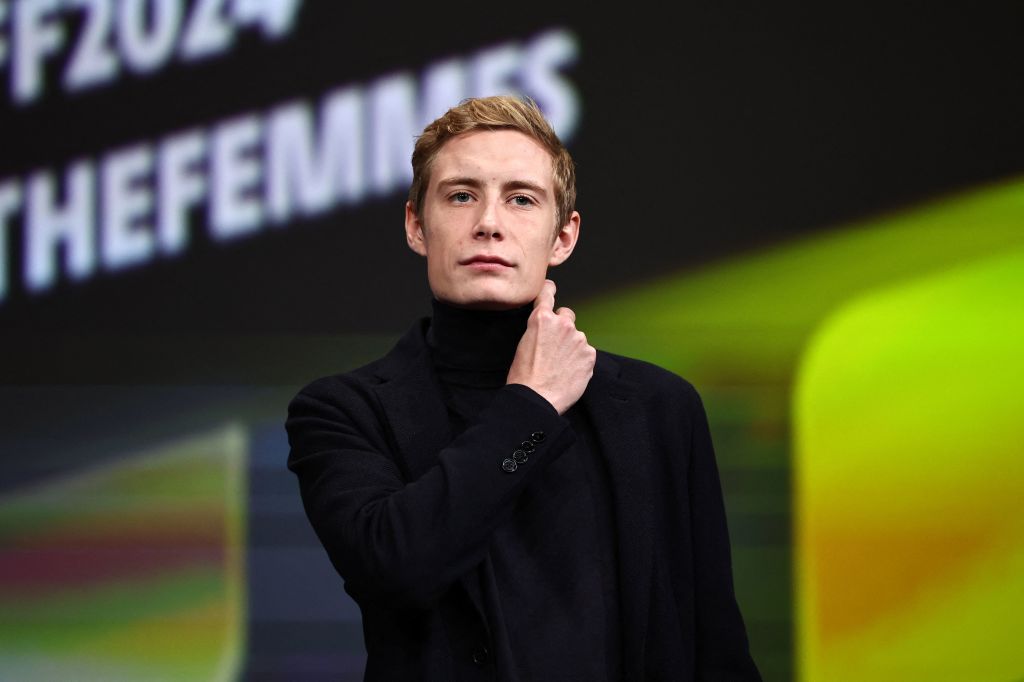
Pre-Tour schedule:
- O Gran Camiño (February 22-25)
- Tirreno-Adriatico (March 4-10)
- Itzulia Basque Country (April 1-6)
- Critérium du Dauphiné (June 2-9)
Why change a winning formula? Jonas Vingegaard’s schedule is essentially a replica of his 2023 campaign, with the only minor tweak coming in his decision to swap Paris-Nice for Tirreno-Adriatico. By this point in his career, Vingegaard knows exactly what he needs to do – and when – in order to be at his best for the Tour.
He again starts his season in Galicia at O Gran Camiño, and the 2.1 race allows the Dane and his Visma-Lease A Bike team to run through their scales in a decidedly relaxed setting, not unlike Miguel Indurain and Banesto’s jaunt to the low-key Volta ao Alentejo in 1996.
After Tirreno, Vingegaard will return to familiar terrain at Itzulia Basque Country, which was such a key step towards his emergence as a Grand Tour contender in 2021. A year ago, Vingegaard was utterly dominant in the Basque Country, though the competition should be more intense this time out, with Evenepoel and Roglič both likely participants, marking a rare occasion when more than two of the main contenders will cross paths before the Tour.
Vingegaard’s final approach to the Tour, meanwhile, sees him return to the Dauphiné for the fourth successive year, having delivered a chilling statement of intent at the race last season.
By now, the 27-year-old knows his routine and clearly understands the rhythms of building towards July. The biggest change for him in 2024 comes not in his preparation, but in his supporting cast, with Wout van Aert opting to ride the Giro rather than the Tour.
It remains to be seen, too, precisely how Sepp Kuss is deployed in the aftermath of his Vuelta victory last year. Vingegaard is, of course, at the very top of Visma-Lease A Bike’s depth chart, but Kuss surely won’t be asked to sacrifice his own prospects from the outset.
Remco Evenepoel
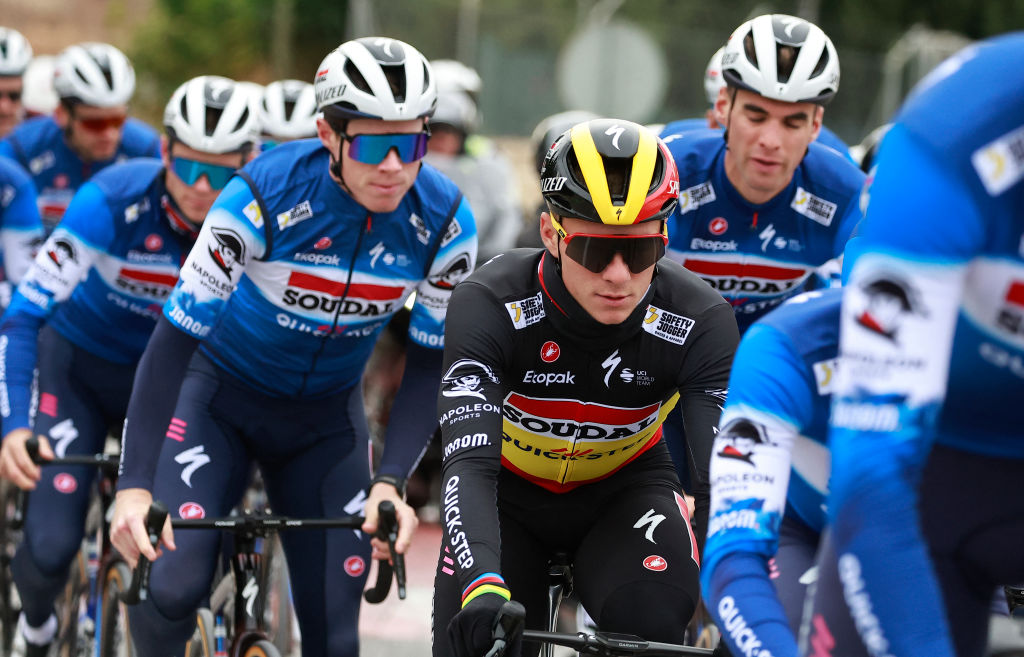
Pre-Tour schedule:
- Figueira Champions Classic (February 10)
- Volta ao Algarve (February 14-18)
- Paris-Nice (March 3-10)
- Itzulia Basque Country (April 1-6)
- Amstel Gold Race (April 14)
- Flèche Wallonne (April 17)
- Liège-Bastogne-Liège (April 21)
- Critérium du Dauphiné (June 2-9)
Even amid all the hype, there’s a case to be made that Remco Evenepoel is still somehow underrated. He is held to a higher standard than just about any other 23-year-old rider in the recent history of the sport.
Even now, Evenepoel still finds people doubting whether he is, in fact, a rider capable of winning Grand Tours at all, despite claiming the overall title at the 2022 Vuelta a España.
“He’ll never be a great stage race rider,” proclaimed Claudio Chiappucci (he of four stage race victories and zero Grand Tour wins) this winter of a man who has already won eleven stage races as a pro, including that Vuelta.
In some ways, Evenepoel’s trajectory puts one in mind of Wayne Rooney. Like the English footballer, Evenepoel arrived at the top level still a teenager yet seemingly already fully formed as an athlete. He has also, like Rooney, had the misfortune to compete at the same time as a pair of juggernauts, with Pogačar and Vingegaard standing, for now at least, as the Messi and Ronaldo of this era of the Tour de France.
Yet Rooney still enjoyed a remarkable career, winning everything available at club level with Manchester United and surpassing Bobby Charlton’s goalscoring record for England to boot. By the same token, Evenepoel’s palmarès – fifty wins before his 24th birthday, including the Vuelta, two world titles and two Liège-Bastogne-Liège victories – is astonishing.
2024 has been billed as the biggest season of Evenepoel’s career to date, but then they all are for Belgium’s most scrutinised talent since Eddy Merckx. Few Tour debutants will ever have been as thoroughly acclimated to the spotlight beforehand as Evenepoel. Whatever about losing to Vingegaard, Roglič and Pogačar on the road, he certainly won’t be defeated by the magnitude of the occasion itself.
Evenepoel starts his season on familiar terrain in Portugal, taking in the Figueira Champions Classic ahead of the Volta ao Algarve. In March, he makes his Paris-Nice debut, which also serves to acquaint him with French roads – in his career to date, the Belgian has raced across the border just twice, at the Chrono des Nations. After a likely rendezvous with Vingegaard and Roglič in the Basque Country, Evenepoel heads on to the Ardennes Classics, where he chases a third straight Liège-Bastogne-Liège triumph.
Those close to Evenepoel have spoken of his preference for clearly defined projects, and it’s perhaps telling that he doesn’t plan to train at altitude in 2024 until after the Ardennes Classics. The really serious business, in other words, starts in early May, when the countdown to the Tour and Olympics gets underway in earnest, with the Dauphiné his last big test before the Grand Départ.
Evenepoel is the biggest unknown among the four principal Tour contenders, not only because he is a debutant, but because his limits are not yet clear. The ruinous jour sans at last year’s Vuelta notwithstanding, the Evenepoel of 2023 often looked better than his remarkable 2022 vintage, and one senses there is still margin for improvement, especially in three-week races.
Logic says Evenepoel is unlikely to improve quickly enough to beat Vingegaard et al at the Tour, of course, but the Belgian is still right to start 2024 with that ambition. Or, as Soudal-QuickStep manager Patrick Lefevere put it to Het Nieuwsblad: “Knowing my character and that of Remco, he wants to win. He’s a winner, a killer. He is going for a stage victory as a starting point, but he wants more.”
Primož Roglič
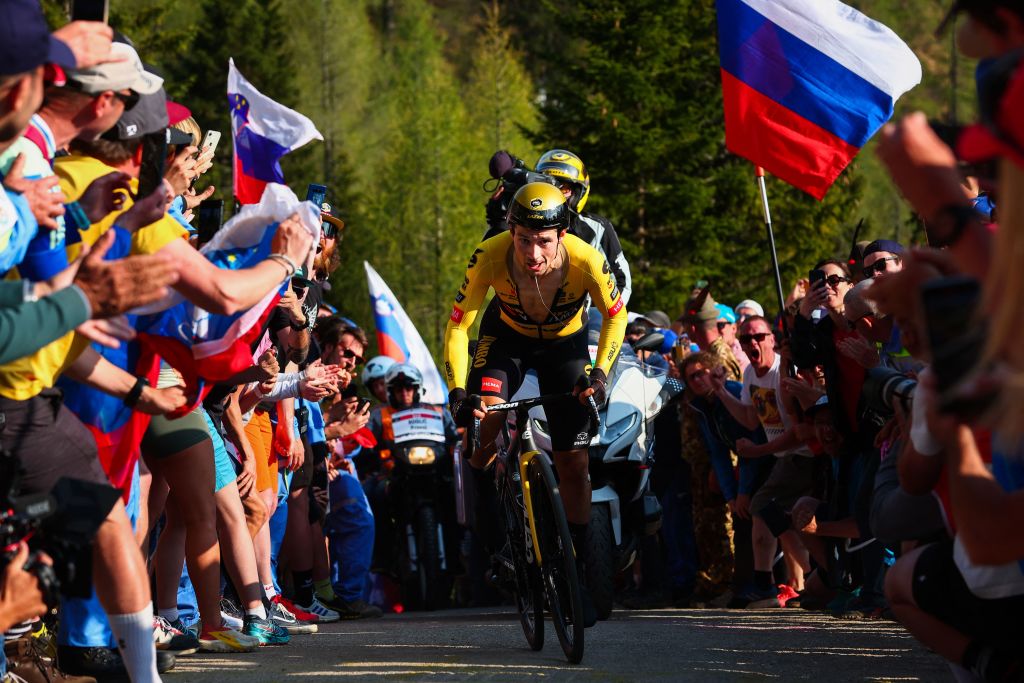
Pre-Tour schedule:
- Paris-Nice (March 3-10) or Tirreno-Adriatico (March 4-10)
- Itzulia Basque Country (April 1-6) [Probable]
- Critérium du Dauphiné (June 2-9)
From the way Rolf Aldag laid it out last Wednesday, early-season feats of ‘Roglification’ (TM Daniel Friebe) dominance won’t be a staple of the menu in 2024. During his time at Jumbo-Visma, Primož Roglič’s calling card was his astounding consistency in week-long stage races, thanks to his rare ability to burn off all comers and hoover up bonus seconds on hilltop finishes.
Starting with the 2018 Ituzlia Basque Country, Roglič has won 13 of his last 17 week-long stage races, and that record would likely be even more imposing were it not for heavy crashes while leading both the 2020 Dauphiné and 2021 Paris-Nice. When Jumbo-Visma released Roglič last Autumn, they acknowledged that they were letting a slew of wins walk out the door with him. Yrt for Bora-Hansgrohe, victory in July 2024 is the only one that really counts.
With that in mind, Aldag explained that Roglič’s racing schedule has been designed to bring him steadily to the boil in the summer rather than expecting him to deliver early and often throughout the campaign. “Our goal is the Tour de France and we’ve worked backwards from that,” Aldag said.
After a spell of altitude training, Roglič will begin his season in March, at either Paris-Nice or Tirreno-Adriatico – “They’re both at the same time, so right now, it doesn’t really matter which one he races,” said Aldag.
He will then return to altitude ahead of an expected, but not yet confirmed, participation at Itzulia Basque Country. Roglič will again be cloistered in thin air in May before using the Critérium du Dauphiné as his final warm-up for the Tour.
After winning last year’s Giro, Roglič briefly floated the idea of tackling the Tour de Suisse, one of the few races missing from his palmarès. He was keen to add the Tour de Suisse to his palmares in 2024, too, but it was eventually agreed that the Dauphiné was a non-negotiable part of his build-up to July. “It’s not a one-year deal with us,” Aldag explained. “I’d rather he went to Tour de Suisse as a reigning Tour de France champion next year.”
It all means that Roglič will start the 2024 Tour with, at most, 22 days of racing in his legs, fewer than those currently projected for Vingegaard (25), Pogačar (38) and Evenepoel (29). Then again, a delayed start to serious training due to injury and a similarly light racing schedule (Tirreno and Catalunya) served Roglič perfectly well ahead of the 2023 Giro, where he produced his best at the very last on Monte Lussari. Aldag, Roglič and his coach Marc Lamberts, who moved across with him from Jumbo, didn't simply sketch out a path to the 2024 Tour on the back of a napkin. There is a clear rationale behind it.
“It’s just a steady build-up to the Tour,” Aldag said, highlighting a one-peak strategy for Roglič's summer. “What we don’t aim for is a super-high peak, then recovery and building up again. We’re not super stressed about the low number of races. The last thing we want to do is squeeze Primož for everything we can just because he could win in Mallorca or Valencia or wherever. What we want to do is win the Tour de France.”







